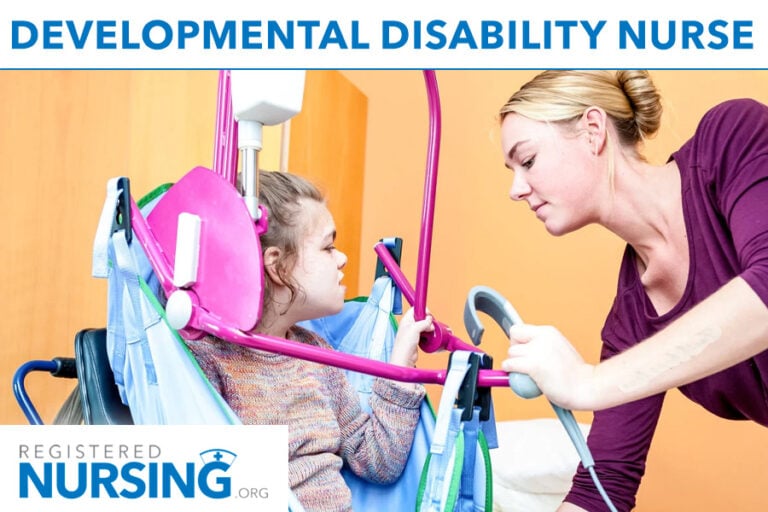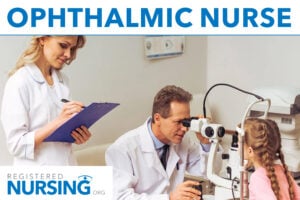Developmental Disability (Special Needs) Nurse

What is a Developmental Disability/Special Needs Nurse?
A developmental disability/special needs nurse works with patients or populations that have developmental disabilities such as Autism Spectrum Disorder, Down Syndrome, Fragile X syndrome, cerebral palsy and many other developmental disorders. Working with patients from newborn to adult, developmental disability nurses are an important point of contact for patients and their families, as well as the rest of the interdisciplinary care team.
How to Become a Developmental Disability Nurse
Registered nurses may find success in looking for job postings through hospitals and specialist offices, as well as government and community agencies. While some nurses apply for the developmental disability nurse role right after graduation and licensure, many wait until they have some nursing experience before applying.
At present, there are no formal internship opportunities for new graduates who apply for the role, though hospitals may have their own procedures in place, or have an agreement with local nursing programs to facilitate intake and training. Internships typically include both a didactic and practical component.
As previously stated, nurses with more experience often find the role of nursing individuals with special needs to be a fulfilling career choice. With some additional training on developmental disabilities, rights of individuals under the Americans with Disabilities Act, the Developmental Disabilities Nurses Association (DDNA), and more, nurses will be ready for the challenges of the role.
What Are the Schooling Requirements for a Developmental Disability Nurse?
Post-graduation from a 2-year Associate’s Degree in Nursing (ADN) program or 4-year Bachelor’s of Science in Nursing (BSN) degree from an accredited nursing school, nurses must of course obtain their RN license after passing the NCLEX examination. RNs must work for two or more years with patients that have developmental or intellectual disabilities prior to becoming eligible for certification through the Developmental Disabilities Nurses Association (DDNA).
Are Any Certifications or Credentials Needed?
While not a requirement, seeking certification through the DDNA means that you have attained a level of competency and experience with a vulnerable population. Certification articulates that you have specialized knowledge in the field and with regard to disabilities and related conditions.
As you can see, there are many factors that contribute to how long it will take you to become a developmental disability/special needs nurse:
| Requirement | Description | Timeline |
| High School Diploma or GED | Basic educational foundation required to enter nursing programs. | 4 Years |
| ADN/ASN or BSN | Basic nursing education required to become a registered nurse (RN). ADN programs are shorter, while BSN programs provide more comprehensive education. | ADN: 2-3 years, BSN: 4 years |
| RN Licensure | Passing the NCLEX-RN exam is required to become a licensed registered nurse. | After graduation (ADN or BSN), typically within 6 months to 1 year |
| Clinical Experience in Developmental Disability/Special Needs Nursing | Gaining experience by working with patients with developmental disabilities or special needs in various healthcare settings. | 1-2 years |
| Developmental Disabilities Nurse Certification (CDDN) | Certification that validates specialized knowledge in caring for individuals with developmental disabilities. | Requires RN licensure and 2 years of practice in the field, followed by passing the certification exam |
What Does a Developmental Disability Nurse Do?
In addition to advocacy, the developmental disability/special needs nurse will work closely with the interdisciplinary team made up of medical personnel, social workers, support staff members, language therapists, and occupational therapists to help patients achieve a good quality of life and health, whether they live independently, in a group setting, or in an institution. Nurses may also work or volunteer as community advocates and points of contact for families of patients in their childhood years, teens, or as adults.
Where Do Developmental Disability Nurses Work?
Developmental disability nurses work primarily in patient-facing roles in the clinic, the community, with families, or possibly in a group home or institutional setting. Some nurses who work with the special needs population do choose to pursue teaching, administration, and/or policy work – however, most jobs are patient-focused. Generally speaking, you can find developmental disability nurses in:
- Clinics
- Hospitals
- Group homes
- Schools
- Government agencies
What Are the Roles & Duties of a Developmental Disability Nurse?
- Works with parents and caregivers to develop an evidence-based plan for school or work
- Coordinates various aspects of care
- Analyzes health information and makes recommendations accordingly
- Manages health screenings at school or in the workplace according to established guidelines
- Provides health-related education and advocacy to various stakeholders involved in the patient’s life
- Develops health-related policies and procedures
- Manages professional nursing services
- Records accurate records for the interdisciplinary team
- Refers patients to other staff or services for a variety of developmental, social, and mental health support
- Acts as a liaison between family, educators, external health and advocacy organizations, as well as the medical team
- Researches and recommends modification of educational or workplace programming and roles
Developmental Disability Nurse Salary & Employment
While standards of preventative care have risen over the past generation, resulting in fewer individuals with developmental differences and special needs, diagnostic tools for genes and behavior have vastly increased the amount of knowledge that we have about the best treatment and outcomes for patients with special needs. This has resulted in the demand for RNs who are highly skilled, certified, and, most of all, compassionate toward their chosen special needs patient population. Individuals with special needs and facilities that support them are found throughout the country. However, nursing salaries may increase in urban areas where the cost of living is higher.
At present, the average salary for a developmental disability nurse ranges from $61,500 to $118,000 depending on location, experience and qualifications. Many nurses receive a mileage stipend as there is often a home-care component to the job. Here is a table that demonstrates the full range of salary you can expect as a developmental disability/special needs nurse:
| Yearly Pay | |
| Lowest Earners | $61,500 |
| Average Pay | $80,321 |
| Top 25% | $90,000 |
| Top Earners | $118,000 |
Helpful Organizations, Societies, and Agencies
- Developmental Disabilities Nurses Association (DDNA)
- NY State Intellectual Disabilities/Developmental Disabilities Nurses Association
- International Journal of Developmental Disabilities
- Journal of Intellectual & Developmental Disability








